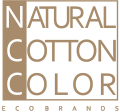Sustainability
Color cotton is an alternative to the traditional cotton production system. Developed by Embrapa in Paraíba, the cotton is grown already with color without the use of additives, preserving the environment.
“As the plume is already grown colorful, dispensing the dyeing phase, ensuring an economy of 87.5 % of water in the mesh finishing process, compared with artificially colored fabrics” ( Gilvan Ramos – Embrapa)
The production is oriented based on social and environmental sustainability. Fruit of family farming, organic color cotton is planted on a guaranteed purchase basis. Irrespective of the result, the price paid by the NCC EcobrandsGroup to the farmer is the best in Brazil. The entire production chain (which includes farmers, weavers, artisans and garment makers) is made up of workers gathered in associations. This production system is certified by the Biodynamic Institute (IBD) since 2012.
In the creation and development of NCC Ecobrands’products, emphasis is placed in associating the design with handicrafts, inserting lace, embroidery, crochet, macramé, among other handcraft techniques – contributing to the social development of local communities in the State of Paraíba, which are the regional pillars of the participating companies.
To ensure the ecofriendly concept, even in the diversification of the fabrics’ colors or insertion of trims in the products, natural dyes are made frombark and leaves.
Sustainability only exists with the integration of the three dimensions of sustainable development: economic, social and environmental. Without these three pillars,sustainability is not sustainable. (Source: USP)
Nowadays it is argued that cultural aspects must be addressedin the issue of sustainability. In regardto this, the NCC EcobrandsGroup is at the forefront, as it has been introducing a bit of the local culture into the global marketsince 1995.
 Organic and Natural Cotton Color
Organic and Natural Cotton Color
